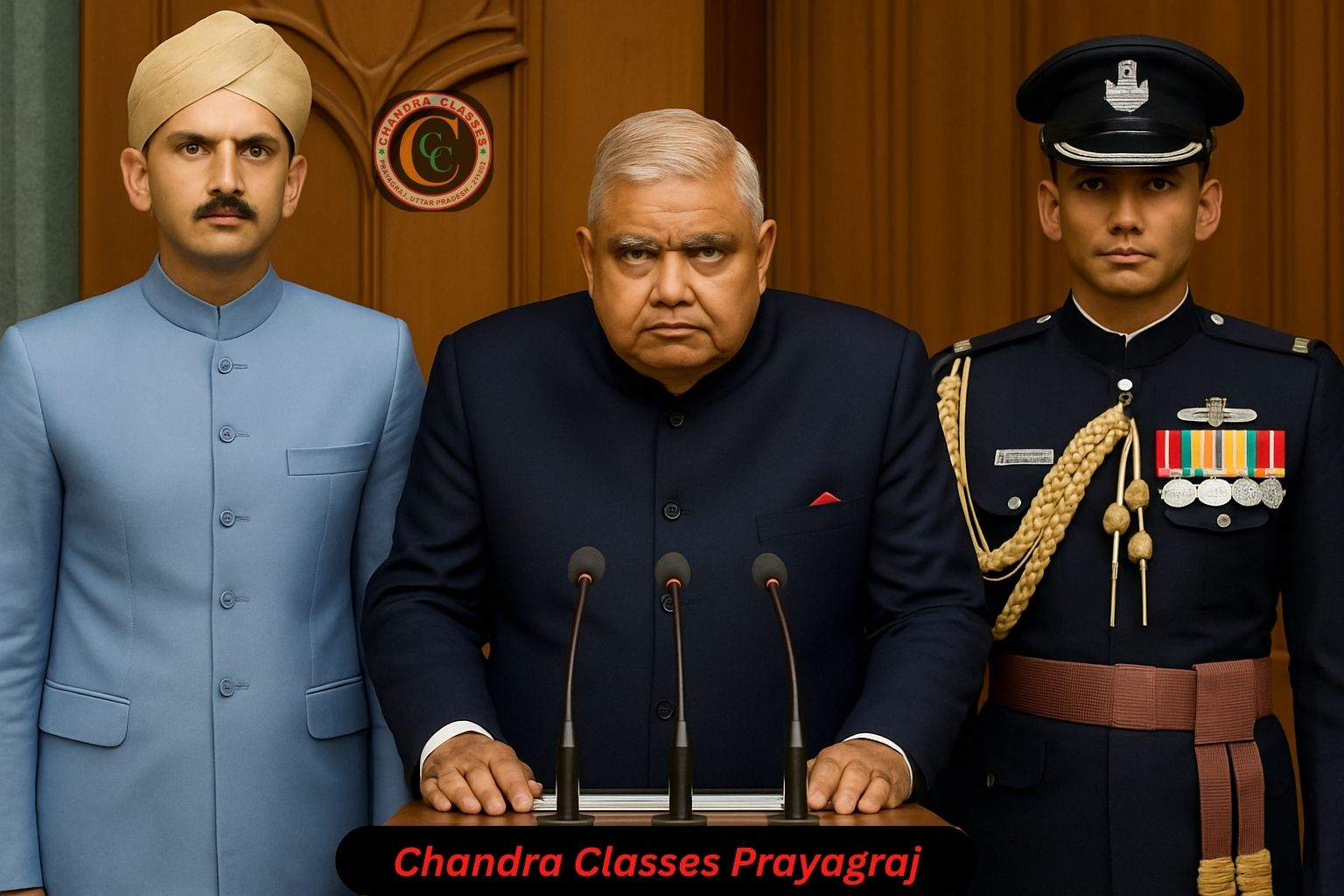🏛️ Introduction
The Vice President of India holds the second-highest constitutional position, following the President. The resignation from this post is rare but allowed under the Constitution. When a Vice President steps down, it initiates a chain of events impacting both Parliamentary leadership and national governance.
Recently, Jagdeep Dhankhar—India’s 14th Vice President—resigned on 21 July 2025, citing health reasons. This event marked a historic first in Indian politics and triggered widespread constitutional, political, and legal analysis.
This Chandra Classes blog offers a detailed breakdown of:
- Relevant constitutional provisions (Articles 63–68, 89)
- The reason and implications of Dhankhar’s resignation
- Post-resignation benefits
- Exam-relevant questions and FAQs
📜 Constitutional Provision for Resignation
🔹 Article 67(b) – Resignation
“The Vice President may, by writing under his hand addressed to the President, resign his office.”
🔸 No need for Parliamentary approval
🔸 Resignation is immediate upon President’s acceptance
🔹 Article 68(2)
“An election to fill a vacancy… shall be held as soon as possible, and in no case later than six months.”
📅 Jagdeep Dhankhar’s Resignation: Real-Life Context
- Date of Resignation: 21 July 2025
- Reason Cited: Health grounds (following multiple hospitalizations and fainting episodes)
- President Droupadi Murmu accepted his resignation with immediate effect.
🩺 Medical Background:
- Hospitalized at AIIMS Delhi in March 2025
- Public collapse in June 2025
- Medical team advised stepping down from public office
🗣️ “To prioritise health and follow medical advice, I hereby resign…” – Jagdeep Dhankhar, resignation letter
🕵️♂️ Political & Parliamentary Implications
➤ Disruption in Rajya Sabha
- The VP is ex-officio Chairman of the Rajya Sabha
- His resignation affected legislative debates, decision-making, and bill passage
- Deputy Chairman Harivansh Narayan Singh assumed temporary charge
➤ Election of New Vice President
- ECI will conduct the election within 6 months
- Voting is done by electoral college (Lok Sabha + Rajya Sabha MPs) via proportional representation
➤ Political Speculations
While officially attributed to health, leaders like Ashok Gehlot and P. Chidambaram hinted at:
- Pressure from ruling party
- Disagreements with government on constitutional issues
- Boycotts of committee meetings and internal rifts
🔁 What Happens After Resignation?
1. Vacancy Declared
- Office becomes vacant immediately upon resignation
2. Temporary Arrangements
- Deputy Chairperson presides over the Rajya Sabha
- If both President and VP are absent, Chief Justice of India (CJI) may temporarily assume Presidential duties
3. Election within 6 Months
- Mandated by Article 68(2)
- Overseen by the Election Commission of India
🧾 Post-Resignation Benefits (As per VP Pension Act, 1997)
| Benefit Type | Details |
|---|---|
| 💰 Pension | ₹4 lakh per month |
| 🏠 Accommodation | Rent-free government bungalow in Delhi or HRA |
| 🚗 Travel Allowance | Free air/train travel across India |
| 👨💼 Office Staff | Private Secretary, driver, peon |
| 🛡️ Security | Continued personal security |
| 🏥 Medical | Full CGHS (Central Govt. Health Scheme) access |
| 🎖️ Ceremonial Honors | State protocol and VIP treatment |
🤔 Why Might a Vice President Resign?
- Health-related concerns or old age
- Voluntary retirement from politics
- Ambitions to contest for President
- Political pressure or disagreements
- Ethical or symbolic reasons
📘 Key Constitutional Articles
| Article | Description |
|---|---|
| 63 | There shall be a Vice President of India |
| 66 | Election process for VP |
| 67(b) | Resignation procedure |
| 68(2) | Election timeline for vacancy |
| 89(1) | VP as Chairman of Rajya Sabha |
🔍 Exam-Oriented FAQs (Chandra Classes Focused)
Q1. Who accepts the resignation of the Vice President?
A: The President of India.
Q2. How long to elect a new Vice President?
A: Within 6 months (Article 68(2)).
Q3. Can a former VP be re-elected?
A: Yes, if not otherwise disqualified.
Q4. Who chairs Rajya Sabha after resignation?
A: The Deputy Chairperson until a new VP is elected.
Q5. Does resignation bar future political roles?
A: No. The former VP can contest elections or hold public office again.
Q6. Is resignation of Vice President common?
A: No. Jagdeep Dhankhar is the first VP to resign mid-term.
Q7. How does this affect exam preparation?
A: This topic is highly relevant for UPSC, State PCS, SSC, Judiciary, and Law entrances. Expect MCQs, Current Affairs questions, and Mains-based essay questions.
🎯 Key Takeaways
| Aspect | Detail |
|---|---|
| Office Vacated | Vice President of India |
| Date of Resignation | 21 July 2025 |
| Successor Yet to be Elected | Election within 6 months |
| Temporary Chair of Rajya Sabha | Harivansh Narayan Singh |
| Real Cause | Health + Political Speculation |
| Benefits | Pension, security, travel, CGHS |
🧠 Chandra Classes Tips for Aspirants
🖊️ Learn the exact Articles (especially 67(b), 68(2))
📚 Revise constitutional roles of VP from Laxmikanth’s Polity
🧩 Practice questions in Chandra Classes’s Polity Test Series
🎯 Use Dhankhar’s case as current example in UPSC Mains or Essay
✍️ Conclusion
The resignation of Jagdeep Dhankhar as Vice President marks a rare and constitutionally significant moment in India’s political journey. While the Constitution provides a structured response to such events, the political undercurrents make it all the more important for aspirants to study it deeply.
From Article 67(b) to post-retirement privileges, understanding every angle of this event enhances your exam preparation and political awareness.
📌 Stay updated with Chandra Classes for high-quality blogs, PDFs, current affairs analysis, and complete exam-oriented preparation material.
📲 Visit: www.chandraclasses.com
📺 YouTube: Chandra Classes Prayagraj
📚 Telegram: Join Chandra Classes Polity & Current Affairs Group

